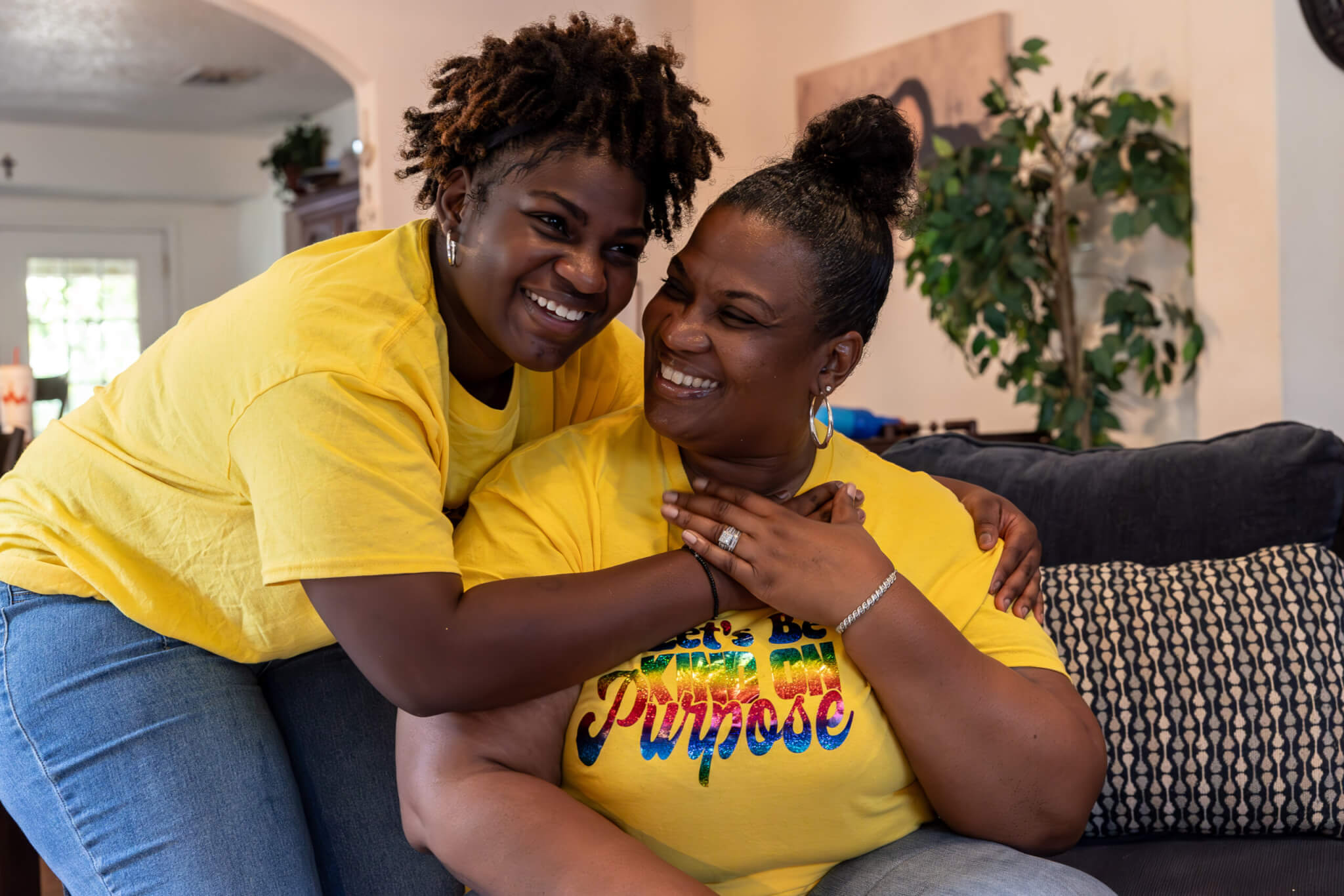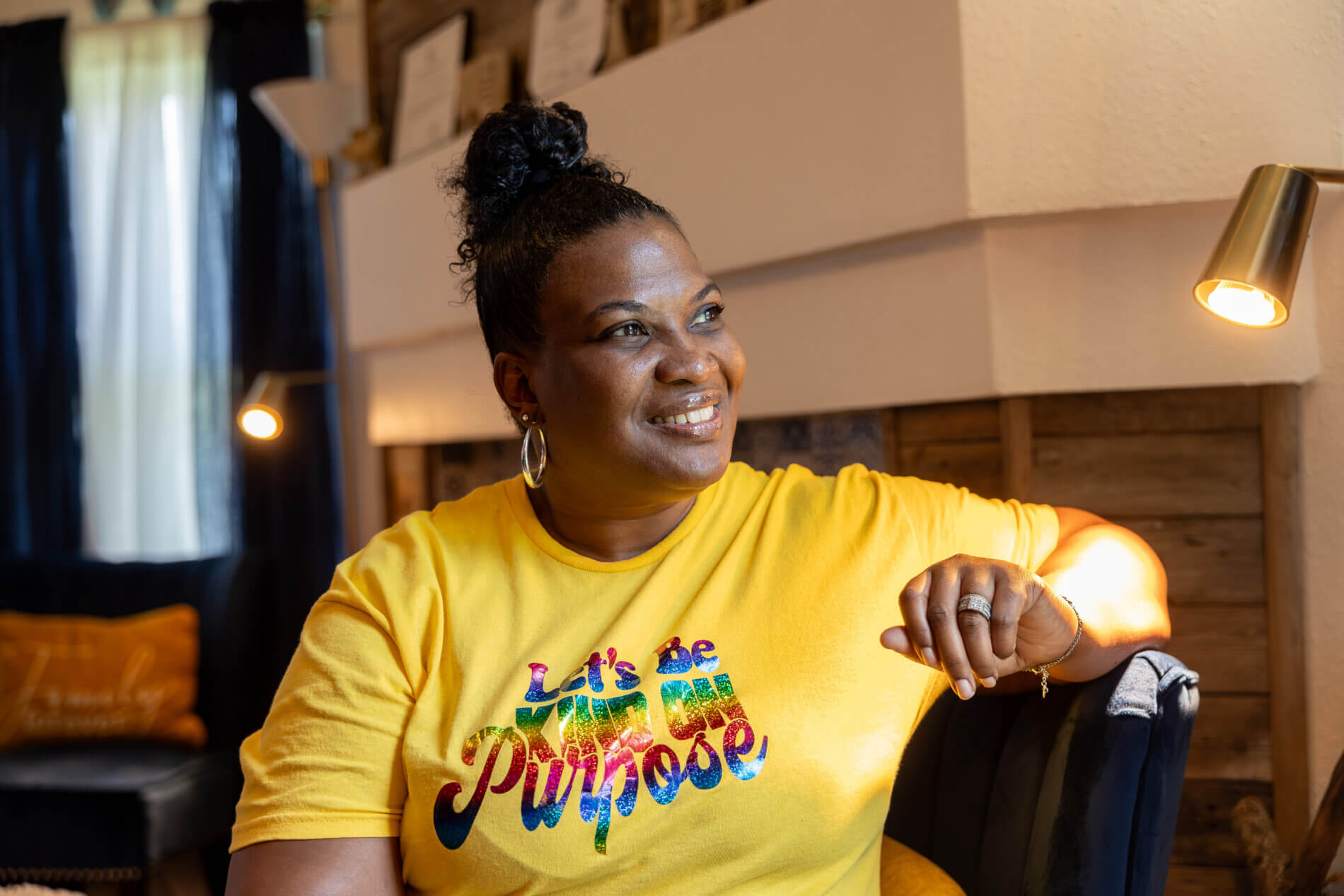
| It Pays to Trust Families. |
|---|
Escaping the Cycle of
Living Month-to-Month
WORDS BY KATIE BEST-RICHMOND
PHOTOS BY BRIA WOODS
What happens when families get extra cash each month with no strings attached? Their lives change.
Just ask Ingrid Sullivan. She will tell you about a man she once met on the bus—it was a key turning point in her life. She had just gotten off the waiting list for public housing, but between working, raising four kids, and getting a divorce, she didn’t have the $150 for the deposit.
“People don’t know this,” she says, “but even when you get accepted into public housing or the vouchers program, you still are responsible for an application fee, a deposit, first month’s rent, renter’s insurance, and sometimes other fees too. So, what do you do?”
As Sullivan was trying to figure out what to do one day, a man on the bus started approaching families. He told one family to follow him, and he would give them help. They ignored him, got off the bus, and went in the other direction. He then came to her and told her to follow him.
They ended up getting off at the same stop, and Sullivan took a chance and followed him. He went to an ATM and withdrew a stack of $20 bills. As they continued walking down the block, he started handing the bills to her and her children. By the time they parted ways, he had given them over $300.
“I call him my angel,” Sullivan says. “It covered everything. It covered our deposit and the cost to move everything.
“That one-time help took care of my life.”
But what happens when you turn that one-time help into monthly cash gifts? This is what UpTogether, a national nonprofit, has built their entire mission around. They give additional income to families who are working but still not able to make ends meet. The cash comes with no strings attached, so families have the power to use it on what they need most.
Not only does UpTogether provide additional income, but they also provide community and support to each of the families. Sound good? Well, UpTogether is hoping this is the not-so-secret combination to moving families out of poverty for good.
Each month, UpTogether families meet to tell their stories and share everything from what grocery store is having a sale on hamburger meat to brainstorming ideas on how to create systemic change for other families in similar situations.
You can be sure Sullivan is sharing her wisdom at every meeting. And she doesn’t come alone. She brings her teenage daughter, Justice, along with her, so she can grow up learning about the issues families face. As a community housing advocate, Sullivan wants her daughter to be prepared to advocate for herself and others one day, too.
You can see just how this real-world education is sinking in. When Sullivan shares her knowledge and experience with the group, her daughter observes and listens, absorbing her mother’s strength and drive.

Unlike her daughter, Sullivan didn’t grow up aware of the issues she is now experiencing. She lived in a house with her mother on the East Coast and remembers having a pretty stable childhood. When she moved to San Antonio with her husband and children, she expected to provide a similar upbringing to her family. However, when she and her husband filed for divorce, she found herself in a situation she didn’t expect.
Like 31% of families in San Antonio, Sullivan was in a category the United Way calls ALICE—asset limited, income-constrained, and employed. ALICE families are better off than the 15% of people who live below the poverty line, but they are not making wages that allow them to afford everything they will need to live in San Antonio.
Sullivan did qualify for some assistance, but she had to get signatures from her employers and spend hours filling out paperwork.
“These other programs reinforce your situation, but UpTogether lets us keep our dignity and our pride,” she says. Whereas many programs give specific guidelines for how funds and support can be used, UpTogether gives the power to the family to decide how to use any money they receive.
Sullivan is not alone. UpTogether, which operates in over 32 cities nationwide, says stories like Sullivan’s are common in their work. “Ingrid’s story demonstrates the power of directly investing in people. In San Antonio, we continue to see how cash investments help families achieve financial stability and alleviate stress,” said UpTogether CEO Jesús Gerena.
Sullivan is passionate about the power of this approach. “UpTogether was the other parent when I was a single mom. It was my lifeline. My friend. It took care of Christmas. It took care of my car. It took care of my car insurance. It took care of gas. It got me into a house with a trampoline and a swing set. It gave us peace and quiet. UpTogether gave my kids what I had growing up,” she shares.
“We were struck by the fact that in 70 years of a ‘war on poverty,’
the U.S. hadn’t moved the needle.”
UpTogether first came to San Antonio with the support of the H. E. Butt Foundation, which recruited other local funders and city officials to the project. When Foundation leaders read a book by UpTogether’s founder Mauricio Miller called The Alternative: Most of What You Believe About Poverty Is Wrong, they decided to further investigate the organization’s innovative economic mobility strategy.
“We were struck by the fact that in 70 years of a ‘war on poverty,’ the U.S. hadn’t moved the needle,” says Perri Rosheger, vice president of community engagement for the Foundation. “We were also excited by the early data that suggested relatively small infusions of cash for families earning had significant positive impact in elevating a family’s income and savings.” This was especially true when combined with building community.
With the support of other area funders, the Foundation was able to lead a strategy to pool resources of over $3 million to bring UpTogether to San Antonio in 2019. Since then, UpTogether has served over 1000 families in San Antonio, including Ingrid’s.
The reason projects like this are necessary is that most public assistance programs cut people off right as they begin to bring in additional income. Making just a few dollars more an hour can mean a sudden end to all public support—a phenomenon known as “the benefits cliff.”
For example, when Sullivan was promoted to Housing Program Manager at the San Antonio Aids Foundation, she was no longer eligible for the public assistance she previously received. However, her raise did not cover the amount she lost. UpTogether helped bridge the gap in her income so that she could continue to grow professionally with the nonprofit.
“But even with [a] great job, I’m still one paycheck away from homelessness myself,” says Ingrid. “It’s real in my life, but I’m riding until the wheels roll off because I love what I do.”

Sullivan doesn’t keep going just for herself. “UpTogether and this job have put me in the position to pay it forward. Because I was helped, I now get to help others. So even if I am still living the struggle myself, I am so grateful to the program and the H. E. Butt Foundation for supporting this pilot in San Antonio.”
Sullivan’s commitment to paying it forward is clear. In addition to her job and work in housing advocacy, she is an active participant in the Foundation’s Know Your Neighbor program. Through its events and online resources, Know Your Neighbor helps neighbors across San Antonio get to know each other better. Using storytelling, the program explores the causes of inequity in different neighborhoods in San Antonio and brings people together to learn and dream of a new way forward.
At every event Sullivan attends, she helps bring awareness around issues of housing and government assistance and teaches her neighbors about our part in these systems.
“At a recent Shared Table [an event series hosted by Know Your Neighbor where neighbors across San Antonio share a meal and conversation about issues affecting families], I had the privilege of sitting with Ingrid,” says David Rogers, president and CEO of the H. E. Butt Foundation. “Our conversation opened my eyes to the different ways our neighbors experience home. Ingrid’s commitment to sharing her knowledge has helped me gain a new understanding of the reality our neighbors face when they have different levels of resources and opportunities.”
Sullivan isn’t afraid to share her story. If you are lucky enough to meet her at one of the Know Your Neighbor events, listen up. You might just learn a thing or two.
“We continue to see how cash investments help families achieve financial stability and alleviate stress.”